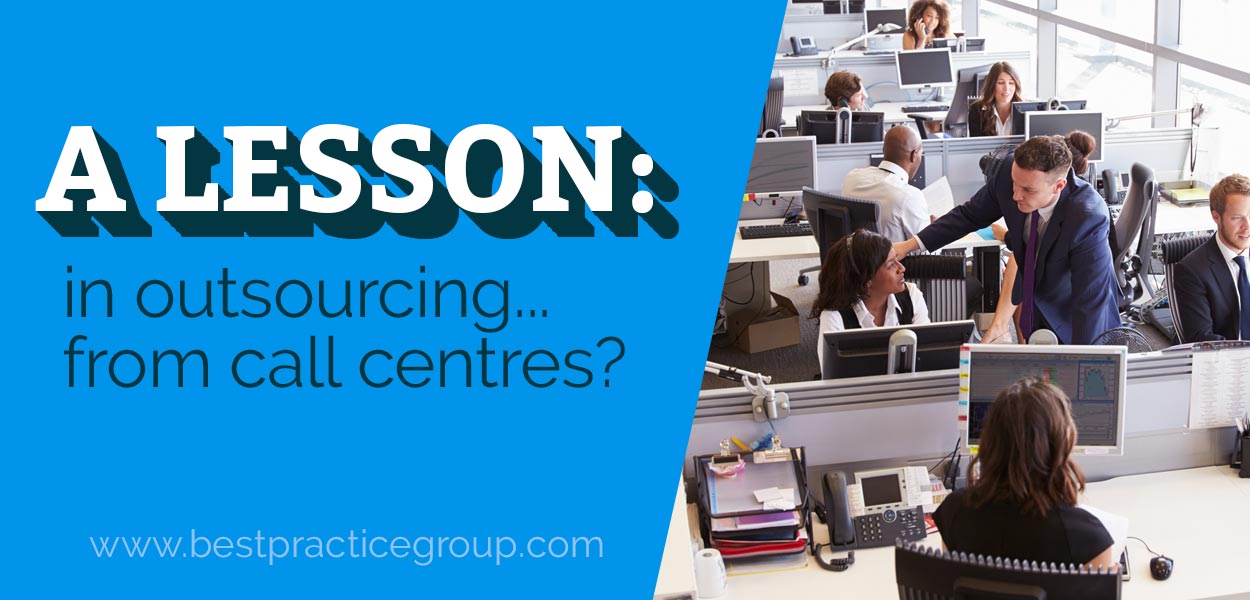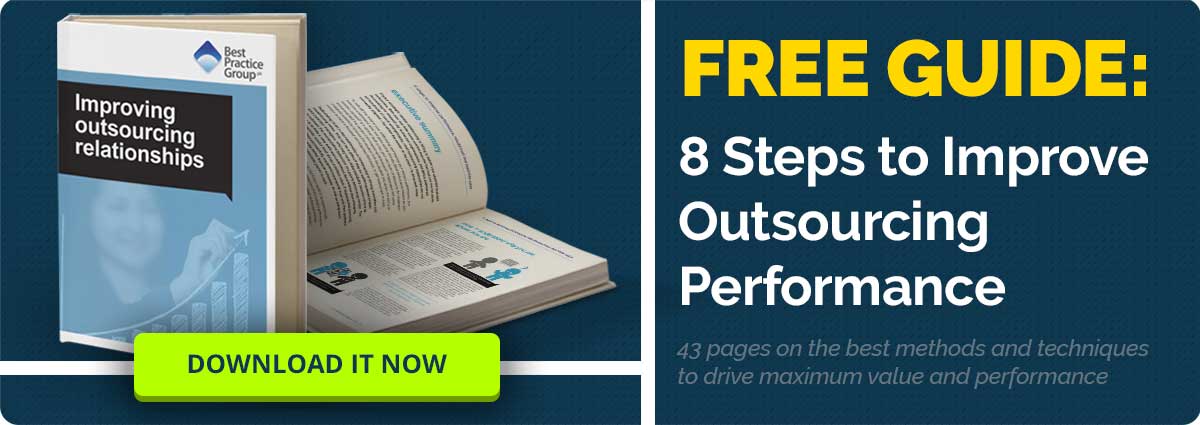
In recent years we have recognised that there has been a marked shift in the way UK supplier managers have been interacting with their provider partners. Where in the past those looking to outsource may have been more focused on price, today it is access to new technologies, new ways of working and improved business outcomes that are prioritised.
Much of the time these sentiments are intentional, but some have yet to be embedded or demonstrated through the formation of truly innovative relationships, which is no surprise, because of the time, dedication, and remarkable complexity of designing and running such relationships.
With great churn, comes great outsourcing maturity
However, according to a number of sources, buyers of call centre outsourcing services appear to be demonstrating a commercial-maturity that other outsourcers could learn much from.
According to Stephanie Overby writing at CIO.co.uk:
“No longer content with simply lower costs, call center outsourcing buyers are looking for providers to deliver emerging technology and improved business outcomes.”
In fact, so much so, that over the last two years more than half of call centre outsourcers have decided not to renew their contracts. Everest, who compiled the research, point to buyers having greater expectations. Their findings demonstrate that new deals are struck to incorporate emerging technologies, automation, and big data analytics. And those suppliers and vendors that can’t meet these increased demands are being shown the door.
This level of outsourcing wisdom is likely due to the short contract lengths and high churn rates that are endemic in the call-centre outsourcing market. Historically, around a quarter to a third of call centre deals up for renewal are terminated every year compared to just 15 per cent of non-voice contracts. Naturally, when you’ve set up a number of these arrangements, you quickly learn what works well, what doesn’t, and how to best choose a vendor that’s a great fit for your organisation – which is much harder to do when you’re managing decade-long, multimillion pound IT relationships that are only likely to change once or twice during your tenure. Even so, the shift in focus to exploiting new technologies and delivering greater business outcomes through outsourcing is a vision that we’ve championed for over a decade.
Jeffrey Puritt, President of TELUS International, said to CIO.com that:
“The global BPO [(Business Process Outsourcing)] industry, which has grown to $150 billion, has evolved significantly over the years. For most buyers, it’s no longer just a cost optimization play. Instead, buyers and their service providers are moving towards more engaged outsourcing models that foster strategic value creation. But getting there is not easy.
“When the focus was more on cost reduction and risk mitigation, multi-vendor strategies worked well. But now [that] the focus has shifted towards business outcomes, buyers are expecting their outsourcing partners to address the entire business process value chain. This means adding more judgment-intensive, value-added services involving new technology, automation, or analytics, as examples. Call center outsourcing (CCO) buyers now expect their incumbent providers to go ‘beyond the obvious’ of the service-level agreement (SLA), especially after the first few years of the relationship. Contracts are not renewed because these relationships have failed to deliver meaningful, long-term, value.”
The inability of a supplier to provide meaningful value over the life of a contract is often the catalyst for our involvement in buyer/supplier relationships. Although, in our experience, we often find that there are also challenges and behaviours on the client-side that do little to help the situation. For example, where requirements are not precisely defined and suppliers are forced to attempt to translate vague specifications into value-adding activities, and where clients’ teams on the ground attempt to control the suppliers’ approach to their work, restricting the very expertise they were selected for in the first place.
In our experience we have found that the partnerships that foster the greatest collaboration and innovation, and produce the best outcomes, are those that dedicate significant resource and attention to proactively building a relationship with the best intentions in mind. This can often be evidenced in fair and equitable contracts, and strong stakeholder relations. Puritt says as much to CIO.com: “…they each require time and effort to manage. As a result, buyers are looking to focus on fewer but more meaningful relationships … But if both parties are committed to a more engaged, meaningful partnership from the beginning, they can work together to proactively nurture the relationship to avoid value leakage. With the shift towards consolidation, there’s an opportunity to focus on building better, more comprehensive, outsourcing relationships from the start.”
One way to achieve this is to set up an ICF team. By putting together a multi-disciplined group of experts who operate with business outcomes at the heart of their activity, you build a conduit through which to measure the health of the relationship that can also pre-emptively steer the arrangement away from possible risks and problems while maintaining an engaged and innovation-led relationship with the buyer/supplier.
Arguably, those involved in buying call-centre outsourcing services have picked up their own wounds through working on a number of these projects, so they’re already familiar with the day-to-day pains involved in managing such a relationship. What’s interesting is that this experience seems to allow them to shrug off and work through the pains, knowing that with persistence, it’ll work out in their favour. However, in some of the strategic relationships we’ve dealt with, we find that these initial pains instead lead to fallouts and misunderstandings that then taint the relationship for the duration of the contract, leading to reduced performance.
So what can we learn from call-centre outsourcers?
Inevitably, when working with a new supplier, there is likely to be some degree of miscommunication, misunderstanding and some initial challenges in overcoming cultural differences in pursuit of a collaborative partnership. Often these are minor irritations, but even if they are not, the important lesson here is to persevere and to work through these differences with improved business outcomes in mind. If you allow these initial difficulties to jade your perception of the relationship, it will affect your behaviour and colour your interactions for the remainder of the contract.
1. If there’s no pain, there’s no gain.
Inevitably, when working with a new supplier, there is likely to be some degree of miscommunication, misunderstanding and some initial challenges in overcoming cultural differences in pursuit of a collaborative partnership. Often these are minor irritations, but even if they are not, the important lesson here is to persevere and to work through these differences with improved business outcomes in mind. If you allow these initial difficulties to jade your perception of the relationship, it will affect your behaviour and colour your interactions for the remainder of the contract.
2. Focus on outcomes
While cost savings are still an important factor in the decision to outsource, a focus on achieving the best business outcomes possible should be front and centre of your decision-making. Before deciding to outsource, consider what your organisation should be able to achieve after the contract is complete. These outcomes should be quantified and measurable so that both parties can monitor and improve performance proactively.
3. Consider what your supplier can bring to the table
Costs savings and achieving business outcomes are prominent indicators of success, but have you considered what else your supplier can do for you? In the quest for innovative partnerships that deliver greater value, understanding how your partner’s technologies, methods and resources can work in synergy with your own, deserves some consideration. Where two suppliers both appear to be able to fulfil your needs, see what else they can do. You may unlock value-streams you might not have previously identified.
4. Play nice
Initial relationship challenges, employee churn and evolving project needs can breed all manner of misunderstandings and stand-offs. But if you’ve invested ample time and resource into choosing the right supplier, the chances are that they want this to work out just as well as you do. Be sure to dedicate all the resource and effort you need to set up a multi-skilled team of specialists to oversee the relationship from beginning to end. The experience they’ll pick up along the way will make them the perfect people to manage stakeholders on both sides, while ensuring that everyone works to the betterment of the relationship.
5. So what else can we take away from call centre outsourcers?
For those involved in complex strategic partnerships, some may only be first or second generation outsourcers who could still be focused on cost-savings or cost-avoidance. Judging by the developments in call-centre outsourcing, many are seeing greater value in working on the relationship itself, giving the supplier room not just to deliver on day-to-day operations, but to also understand the strategic direction and outcomes of the partnership.

